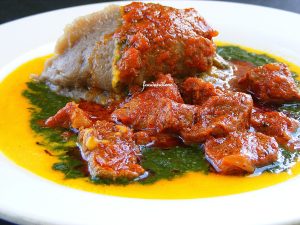
Nkwobi is a Nigerian delicacy you need to try if you’re exploring the flavours of traditional Nigerian cuisine. Known for its tender, spicy meat and creamy palm oil sauce, Nkwobi is a dish that holds a special place in the hearts of many Nigerians. Often enjoyed as a treat at local bars or during special gatherings, this dish is a symbol of celebration and togetherness in Nigerian culture.
The Origins of Nkwobi
Nkwobi hails from southeastern Nigeria, particularly among the Igbo people, where it’s a well-loved local specialty. Traditionally made with cow foot, Nkwobi has a rich history deeply tied to communal gatherings and celebrations. Over time, it has become a popular dish served in urban settings, such as restaurants and bars, where it’s paired with a cold drink. The rich, spicy flavor and soft, gelatinous texture of the cow foot make it a unique experience that both locals and tourists find intriguing.
The Ingredients That Make Nkwobi Special
The secret to Nkwobi lies in its distinctive combination of ingredients. This dish is made by boiling cow foot until it’s tender and then mixing it with a palm oil-based sauce. Here’s a quick breakdown of key ingredients:
- Cow foot: The main ingredient that provides the unique texture.
- Palm oil: Gives Nkwobi its characteristic orange color and rich flavor.
- Ugba (oil bean seeds): Adds an extra layer of taste and authenticity.
- Ehuru (Calabash nutmeg): A key spice for the characteristic aroma.
- Potash: Used to thicken the palm oil into a creamy consistency.
- Onions and Utazi leaves: For garnish, adding freshness and a touch of bitterness.
The Process of Making Nkwobi
To make Nkwobi, cow foot is first cleaned thoroughly and then boiled until it becomes tender. Potash is mixed with water and added to the palm oil, which thickens it and changes its color to a vibrant orange. Once the sauce is prepared, the boiled cow foot is added to the palm oil mixture along with spices such as ground ehuru and pepper. Finally, ugba is stirred in to complete the traditional recipe. This mixture is then served with garnishes like onions and Utazi leaves.
The Cultural Experience of Enjoying Nkwobi
In Nigerian culture, Nkwobi is more than just a meal—it’s a shared experience. It’s often served at local joints and bars, accompanied by traditional palm wine or a cold beer. Many consider it a delicacy to enjoy with friends after a long day or to celebrate special occasions. The communal nature of Nkwobi makes it a dish that fosters connections and conversation, reflecting the values of hospitality and community that are central to Nigerian life.
Variations and Modern Twists on Nkwobi
While the traditional recipe remains the most popular, modern variations of Nkwobi are becoming increasingly popular. Some cooks experiment by using goat meat, chicken, or even seafood to create new takes on the classic dish. Additionally, some restaurants now serve Nkwobi with creative garnishes like sliced avocados or bell peppers, giving it a contemporary flair while preserving the core flavours of the dish.
Why You Should Try Nkwobi
Nkwobi is a dish that offers a unique blend of textures and flavours, making it a must-try for anyone interested in Nigerian cuisine. The combination of tender meat, spicy seasoning, and rich palm oil creates a flavor profile that is both comforting and exciting. For those seeking to expand their culinary horizons, Nkwobi provides an authentic taste of Nigeria’s rich cultural heritage.
A Taste of Tradition and Togetherness
Experiencing Nkwobi means more than just tasting a delicious dish; it’s about connecting with the traditions and hospitality of Nigeria. From its roots in southeastern Nigeria to its popularity across the country, Nkwobi is a culinary gem that captures the essence of Nigerian cuisine. Whether you’re enjoying it at a local restaurant or trying to recreate the dish at home, Nkwobi is sure to leave a lasting impression.
Discover more from Amebo Media
Subscribe now to keep reading and get access to the full archive.




